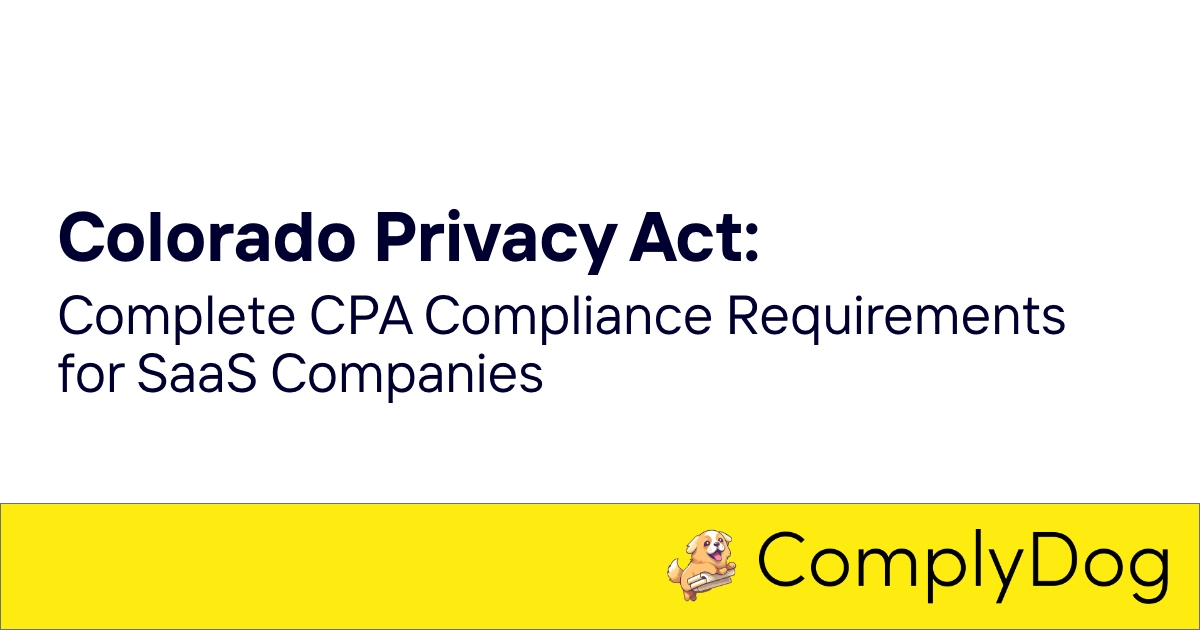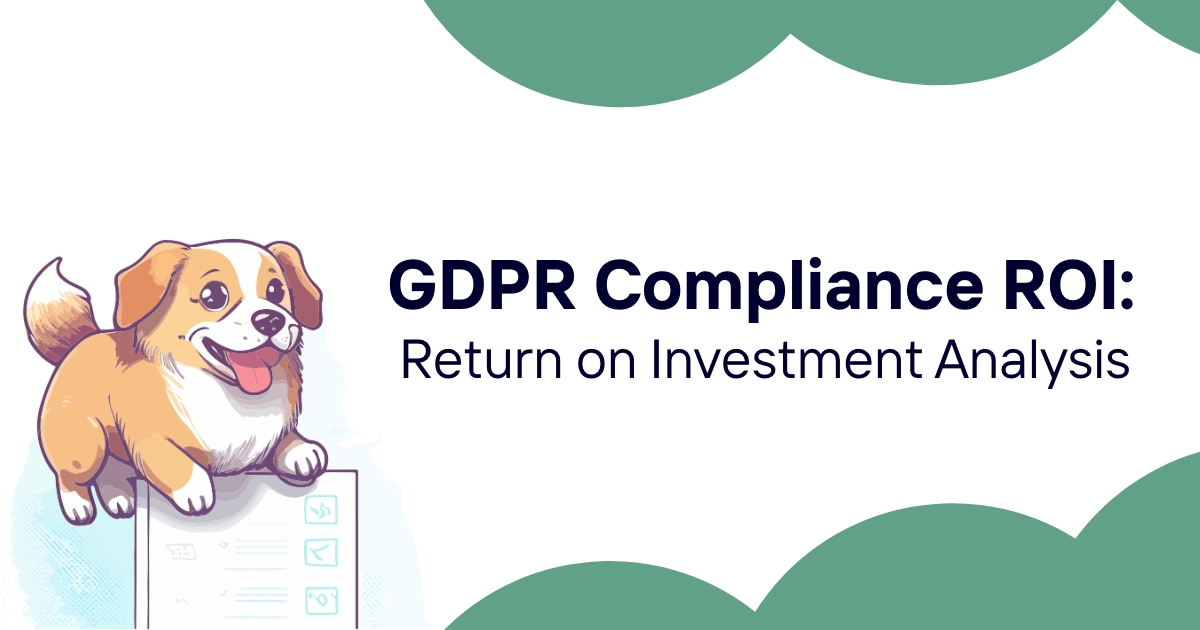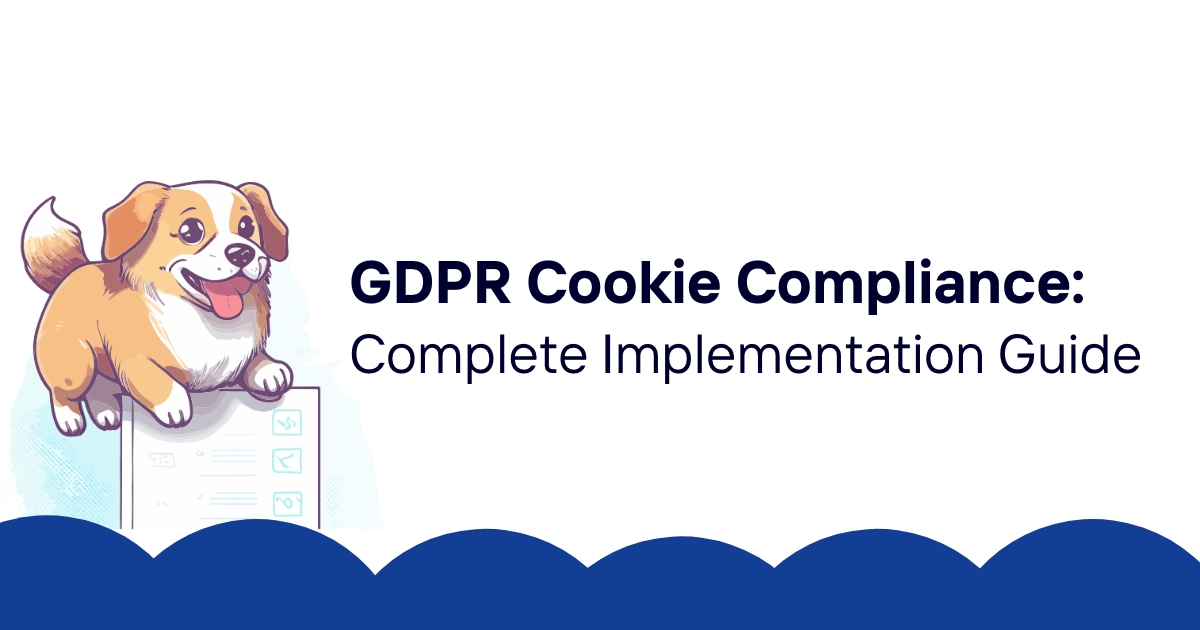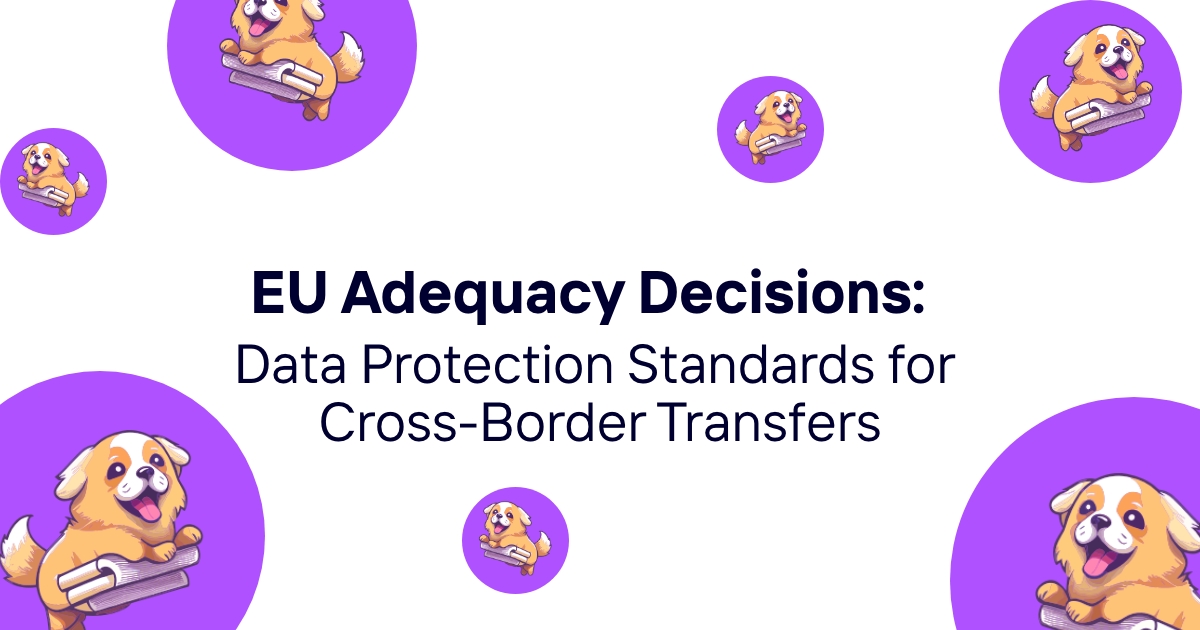Colorado's Privacy Act (CPA) continues the wave of comprehensive state privacy legislation that SaaS companies must navigate as privacy regulation expands across the United States. CPA creates unique compliance requirements that combine consumer rights with risk-based privacy protection, establishing Colorado as a leader in thoughtful state privacy legislation.
The Colorado Privacy Act applies to SaaS companies that conduct business in Colorado and either control or process personal data of 100,000 or more Colorado consumers per year, or derive revenue from selling personal data and control or process personal data of 25,000 or more Colorado consumers.
What sets CPA apart from other state privacy laws is its emphasis on privacy risk assessments for certain data processing activities and its focus on meaningful consent for sensitive data processing. This approach rewards SaaS companies that implement comprehensive privacy protection rather than minimum compliance strategies.
Colorado's privacy law reflects the state's innovation-friendly business environment while providing strong consumer protection. SaaS companies that master CPA compliance gain advantages in serving Colorado's growing technology sector and demonstrate privacy leadership that supports expansion across multiple state jurisdictions.
Building effective CPA compliance requires understanding how Colorado's approach differs from California's CCPA, Virginia's VCDPA, and other emerging state frameworks while creating unified privacy protection that scales across jurisdictions. ComplyDog helps SaaS companies navigate multi-state privacy requirements through comprehensive compliance management that addresses Colorado alongside other state and international privacy frameworks.
Colorado Privacy Act Overview for Software Companies
The Colorado Privacy Act creates comprehensive privacy obligations that apply to SaaS companies meeting specific thresholds while providing flexibility for innovation and business growth in Colorado's technology-focused economy.
CPA Scope and Applicability:
CPA applies to controllers that conduct business in Colorado and meet specific volume thresholds for personal data processing. The law focuses on substantial data processing operations rather than incidental contact with Colorado consumers.
Most SaaS platforms serving Colorado customers need to evaluate their processing volumes carefully, considering both direct customer relationships and indirect data collection through analytics, advertising, and platform operations.
Personal Data Definition:
CPA defines personal data as information that is linked or reasonably linkable to an identified or identifiable individual, including user accounts, device identifiers, behavioral analytics, and inferred characteristics created by SaaS platforms.
The definition excludes publicly available information and properly de-identified data, but SaaS companies must ensure de-identification meets specific standards that prevent re-identification through combination or analysis.
Sensitive Data Categories:
CPA provides enhanced protection for sensitive personal data including personal data revealing racial or ethnic origin, religious beliefs, health conditions, sexual orientation, citizenship status, and genetic or biometric data.
SaaS platforms must implement special protections for sensitive data including consent requirements and enhanced security measures that go beyond standard personal data protection.
Controller and Processor Distinctions:
CPA distinguishes between controllers (determining processing purposes and means) and processors (processing data on behalf of controllers). SaaS platforms often serve both roles depending on the specific data processing context.
Understanding your role in different processing situations ensures appropriate CPA obligations are applied. Customer data hosting might involve processor responsibilities, while platform analytics involves controller obligations.
Business Purpose Exemptions:
CPA provides specific exemptions for certain business purposes including fraud prevention, security monitoring, and legal compliance that allow necessary processing without triggering all consumer rights obligations.
Document business purpose processing carefully to ensure exemptions are applied appropriately while maintaining transparency about data processing activities and consumer rights availability.
For insights on managing multi-state privacy compliance, check out our Virginia privacy compliance guide which addresses similar state privacy implementation challenges.
CPA Consumer Rights and SaaS Implementation
CPA consumer rights create specific implementation requirements for SaaS companies that must provide meaningful access while maintaining operational security and protecting other consumers' information.
Right to Know Implementation:
CPA gives consumers rights to know whether personal data is being processed and access categories of personal data, processing purposes, categories of third parties receiving data, and retention periods.
Design access systems that provide comprehensive information about data processing activities without exposing operational details or other consumers' confidential information through automated or semi-automated response mechanisms.
Data Correction Rights:
Consumers can request correction of inaccurate personal data, requiring SaaS platforms to implement systems that can identify and address factual errors while handling disputes about analytics or inferred information appropriately.
Build correction workflows that distinguish between objective errors requiring correction and subjective assessments that consumers might dispute but that don't constitute inaccuracies under privacy law.
Data Deletion Rights:
CPA deletion rights allow consumers to request deletion of personal data with specific exceptions for legitimate business needs, legal obligations, and other consumers' rights protection.
Implement deletion systems that can remove consumer personal data while preserving information necessary for platform security, legal compliance, and continued service delivery to other users.
Data Portability Requirements:
Data portability rights let consumers obtain personal data in a portable format that allows transmission to another controller, when technically feasible and without revealing trade secrets.
Create portability features that provide genuinely useful data exports in standard formats while protecting proprietary algorithms, business intelligence, and other consumers' confidential information.
Opt-Out Rights Implementation:
CPA provides opt-out rights for targeted advertising, sale of personal data, and certain profiling activities that require SaaS platforms to implement practical opt-out mechanisms.
Design opt-out systems that provide clear control over different types of data processing while explaining the impact of opt-out decisions on platform functionality and service delivery.
Colorado vs California Privacy Law Differences
Understanding key differences between Colorado's CPA and California's CCPA helps SaaS companies build efficient multi-state compliance that addresses each law's unique requirements.
Risk Assessment Requirements:
CPA requires data protection assessments for certain processing activities including targeted advertising, sale of personal data, profiling with legal effects, and sensitive data processing. This requirement doesn't exist in CCPA.
Implement risk assessment procedures that identify when CPA requires formal assessments while supporting ongoing privacy risk management across all data processing activities.
Universal Opt-Out Mechanisms:
CPA recognizes universal opt-out mechanisms that allow consumers to opt out of targeted advertising and sales across multiple websites and services through browser signals or similar mechanisms.
Design opt-out systems that can recognize and honor universal opt-out signals while maintaining CCPA compliance for California consumers who might use different opt-out mechanisms.
Sensitive Data Consent:
CPA requires explicit consent for processing sensitive personal data, while CCPA provides enhanced protection for certain categories without specific consent requirements.
Implement consent systems that obtain appropriate permission for sensitive data processing under CPA while maintaining CCPA compliance through coordinated but law-specific mechanisms.
Cure Period Provisions:
CPA provides a 60-day cure period for violations, allowing companies to address compliance issues before enforcement action. CCPA's cure period is more limited and applies only to specific circumstances.
Build compliance monitoring that can identify potential issues early and implement corrections within cure period timelines while maintaining ongoing compliance across all applicable laws.
CPA Data Processing Requirements for SaaS
CPA creates specific data processing obligations that affect how SaaS companies collect, use, and share personal data while supporting legitimate business operations and innovation.
Data Minimization Principles:
CPA requires limiting personal data collection to what is adequate, relevant, and reasonably necessary for disclosed purposes, affecting how SaaS platforms design data collection and analytics systems.
Audit data collection practices to ensure all personal data serves specific, disclosed purposes that consumers would reasonably expect from your SaaS services and business model.
Purpose Limitation Requirements:
Personal data must be processed for disclosed purposes that are compatible with original collection purposes, requiring clear purpose definition and limitation throughout data lifecycle management.
Document processing purposes clearly and implement controls that prevent unauthorized secondary use or purpose expansion without appropriate consumer notification and consent.
Data Quality Obligations:
CPA requires reasonable measures to ensure personal data accuracy considering processing purposes and consumer interaction, affecting data management and quality assurance procedures.
Implement data quality processes that maintain appropriate accuracy for business purposes while providing mechanisms for consumers to identify and correct personal information errors.
Transparency and Notice Requirements:
SaaS platforms must provide clear, meaningful privacy notices that explain data processing in language consumers can understand and use to make informed decisions about their privacy.
Design privacy notices that satisfy CPA transparency requirements while addressing multi-state compliance needs through layered or jurisdiction-specific disclosure approaches.
Colorado Privacy Law Risk Assessment
CPA's data protection assessment requirements create unique obligations for SaaS companies that must evaluate privacy risks for certain processing activities and implement appropriate mitigation measures.
Assessment Triggering Activities:
CPA requires data protection assessments for processing activities including targeted advertising, sale of personal data, profiling with legal or similarly significant effects, and sensitive data processing.
Identify processing activities that trigger assessment requirements and implement systematic evaluation procedures that address privacy risks while supporting legitimate business purposes.
Risk Assessment Components:
Data protection assessments must identify and weigh benefits of processing against potential risks to consumers, including measures to mitigate identified risks and consideration of less invasive alternatives.
Develop assessment frameworks that provide meaningful risk evaluation while supporting business decision-making about privacy-impactful processing activities and mitigation strategies.
Assessment Documentation:
CPA requires maintaining assessment documentation for regulatory review, creating record-keeping obligations that must balance compliance demonstration with business confidentiality protection.
Implement assessment documentation that provides sufficient detail for compliance demonstration while protecting proprietary business information and competitive intelligence from inappropriate disclosure.
Ongoing Assessment Updates:
Risk assessments must be updated when processing activities change significantly or new risks are identified, requiring ongoing monitoring and evaluation procedures.
Build assessment update procedures that can identify when changes require formal reassessment while maintaining efficient operations and appropriate privacy risk management.
Multi-State Privacy Compliance Strategy
Building effective multi-state privacy compliance requires strategic approaches that address CPA alongside other state privacy laws through unified but flexible implementation frameworks.
Unified Compliance Architecture:
Design privacy compliance systems that can handle CPA requirements alongside California's CCPA, Virginia's VCDPA, and other emerging state frameworks through comprehensive but efficient implementations.
Implement privacy technology that provides the highest applicable protection across multiple state requirements while maintaining operational efficiency and consistent user experience.
State-Specific Implementation Details:
While building unified compliance, ensure CPA-specific requirements receive appropriate attention including Colorado risk assessments, universal opt-out recognition, and state-specific consumer rights.
Consider Colorado market characteristics and business environment when implementing privacy features that exceed minimum compliance while supporting innovation and business growth.
Compliance Monitoring Coordination:
Implement monitoring systems that track compliance across multiple state privacy frameworks while providing unified dashboards and alert systems for regulatory changes and enforcement developments.
Coordinate compliance monitoring to ensure no state framework receives inadequate attention while maintaining efficient oversight of multi-jurisdictional privacy obligations.
Strategic Privacy Investment:
Consider privacy compliance as strategic investment that supports business growth across multiple states rather than just regulatory cost, focusing on implementations that provide competitive advantages.
Build privacy capabilities that demonstrate leadership and innovation while satisfying multiple state requirements through forward-thinking approaches that anticipate regulatory evolution.
CPA Documentation and Record Keeping
CPA compliance requires comprehensive documentation that demonstrates privacy protection commitment while supporting operational efficiency and regulatory accountability.
Privacy Policy Updates:
Update privacy policies to address CPA requirements including consumer rights descriptions, data processing purposes, risk assessment summaries, and contact information for privacy inquiries.
Develop privacy policies that address Colorado consumers specifically while maintaining comprehensive coverage of multi-state privacy requirements and business practices.
Data Processing Records:
Maintain records of data processing activities, purposes, categories, retention practices, and risk assessments that support CPA compliance demonstration and consumer rights fulfillment.
Create processing documentation that provides operational guidance while supporting regulatory compliance through clear, accessible information about privacy practices.
Risk Assessment Documentation:
Document data protection assessments comprehensively while protecting business confidential information from inappropriate disclosure during regulatory review or enforcement actions.
Implement assessment documentation that demonstrates meaningful risk evaluation while maintaining appropriate confidentiality protection for proprietary business information.
Consumer Rights Processing:
Document procedures for handling consumer rights requests including verification, fulfillment, response timelines, and appeal processes that meet CPA requirements while protecting business operations.
Build consumer rights documentation that supports efficient processing while maintaining appropriate security measures and verification procedures that protect both consumers and business interests.
Training and Compliance Records:
Maintain records of privacy training, compliance monitoring, and improvement activities that demonstrate ongoing commitment to privacy protection and regulatory compliance.
Document training programs and compliance activities that show systematic attention to privacy obligations while supporting staff competence and organizational privacy culture development.
Ready to master multi-state privacy compliance? Use ComplyDog and build comprehensive privacy programs that satisfy Colorado's CPA alongside other state and international privacy requirements through efficient, unified compliance management that supports business growth and innovation.


















